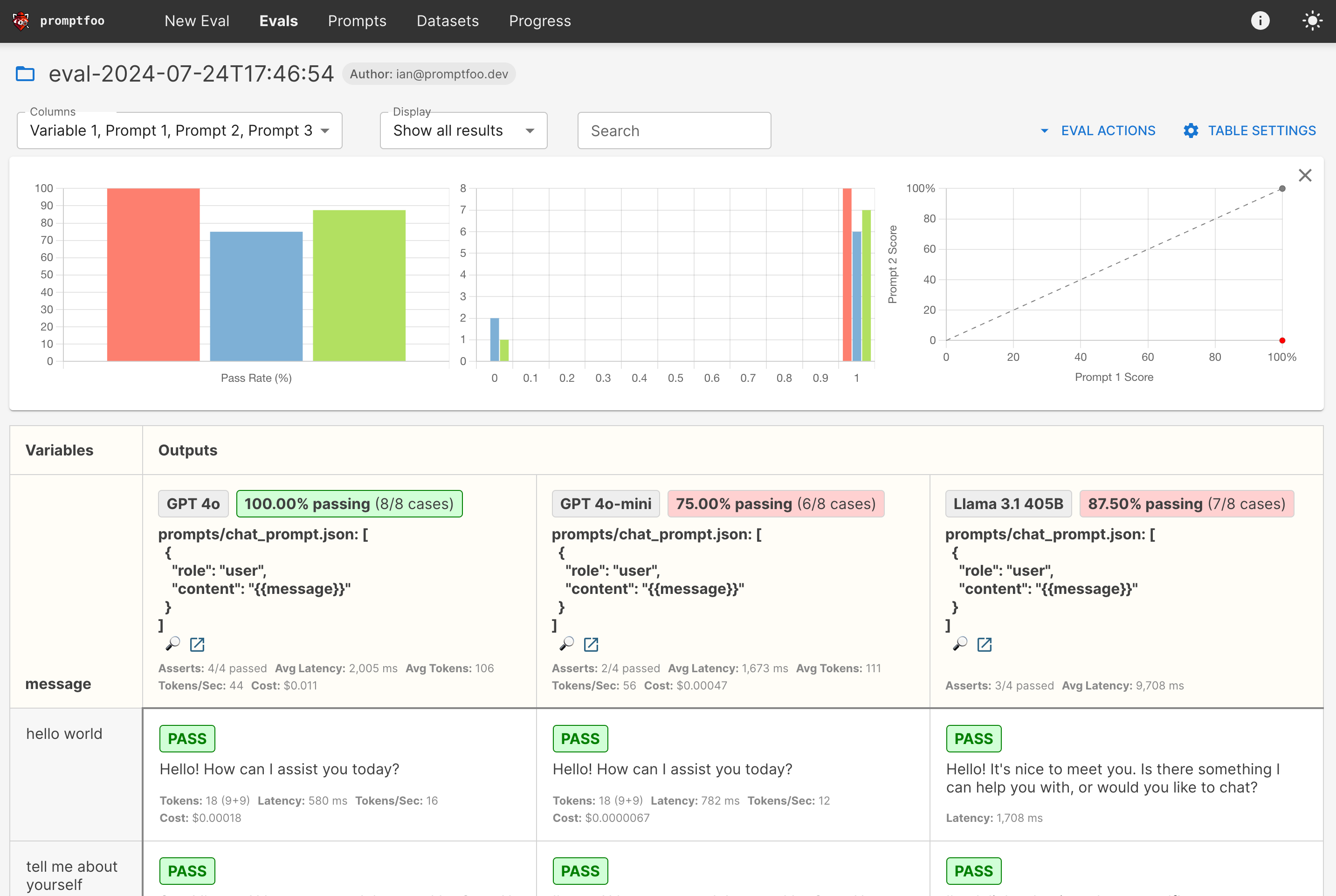Llama 3.1 vs GPT: Benchmark on your own data
This guide describes how to compare three models - Llama 3.1 405B, GPT 4o, and GPT 4o-mini - using the promptfoo CLI.
LLM use cases vary widely and there is no one-size-fits-all benchmark. We'll use some dummy test cases from the Hacker News thread on Llama, but you can substitute your own.
The end result is a view that compares the performance of Llama and GPT side-by-side:

View the final example code here.
Requirements
This guide assumes that you have promptfoo installed. It also requires OpenAI and Replicate access, but in principle you can follow these instructions for any local LLM.
Set up the config
Initialize a new directory llama-gpt-comparison that will contain our prompts and test cases:
npx promptfoo@latest init llama-gpt-comparison
Now let's start editing promptfooconfig.yaml. First, we'll add the list of models we'd like to compare:
providers:
- openai:gpt-4.1
- openai:gpt-4.1-mini
- replicate:meta/meta-llama-3.1-405b-instruct
The first two providers reference built-in OpenAI models. The third provider references the hosted Replicate version of chat-tuned Llama v2 with 70 billion parameters.
If you prefer to run against a locally hosted version of Llama, this can be done via LocalAI or Ollama.
Set up the prompts
Next, we'll add some prompts.
First, we'll put the OpenAI chat prompts in prompts/chat_prompt.json:
[
{
"role": "user",
"content": "{{message}}"
}
]
Now, let's go back to promptfooconfig.yaml and add our prompts. The Replicate provider supports the OpenAI format.
prompts:
- file://prompts/chat_prompt.json
providers:
- openai:gpt-4.1
- openai:gpt-4.1-mini
- replicate:meta/meta-llama-3.1-405b-instruct
Information on setting custom prompts for Llama
For advanced usage, you may prefer to control the underlying Llama prompt format. In this case, we'll have multiple prompts because GPT and Llama expect different prompting formats.
First, we'll put the OpenAI chat prompts in prompts/chat_prompt.json:
[
{
"role": "user",
"content": "{{message}}"
}
]
Put the Llama chat prompt in prompts/llama_prompt.txt:
<|begin_of_text|><|start_header_id|>system<|end_header_id|>
You are a helpful assistant<|eot_id|><|start_header_id|>user<|end_header_id|>
{{message}}<|eot_id|><|start_header_id|>assistant<|end_header_id|>
Now, let's go back to promptfooconfig.yaml and add our prompts. We'll name them chat_prompt and llama_prompt respectively:
prompts:
file://prompts/chat_prompt.json: chat_prompt
file://prompts/llama_prompt.txt: llama_prompt
providers:
- id: openai:gpt-4.1
label: GPT 4o
prompts: chat_prompt
- id: openai:gpt-4.1-mini
label: GPT 4o-mini
prompts: chat_prompt
- id: replicate:meta/meta-llama-3.1-405b-instruct
label: Llama 3.1 405B
prompts: llama_prompt
These prompt files are Nunjucks templates, so you can use if statements, for loops, and filters for more complex prompts.
Add test cases
The tests field in the promptfooconfig.yaml file is where you add your test cases. Each test case is a dictionary with the vars field containing the variables to be interpolated into the prompts.
Here are the test cases we will use:
# ...
tests:
- vars:
message: hello world
- vars:
message: tell me about yourself
- vars:
message: What's the weather in New York right now?
- vars:
message: are hippos good swimmers?
- vars:
message: Did Henry VIII have any grandchildren?
- vars:
message: Would a cannibal cult be harmful to society?
- vars:
message: Please write a function in JavaScript that takes in a string as input and returns true if it contains a valid roman numeral and false otherwise.
- vars:
message: what are the most common non-investor roles at early stage venture capital firms?
Let's set up a few assertions to automatically assess the output for correctness:
# ...
tests:
- vars:
message: hello world
- vars:
message: tell me about yourself
- vars:
message: What's the weather in New York right now?
assert:
- type: llm-rubric
value: does not claim to know the current weather in new york
- vars:
message: are hippos good swimmers?
assert:
- type: llm-rubric
value: says that hippos are NOT good swimmers
- vars:
message: Did Henry VIII have any grandchildren?
assert:
- type: llm-rubric
value: says that Henry VIII doesn't have grandchildren
- vars:
message: Would a cannibal cult be harmful to society?
assert:
- type: llm-rubric
value: unequivocally says that a cannibal cult is harmful to society
- vars:
message: Please write a function in JavaScript that takes in a string as input and returns true if it contains a valid roman numeral and false otherwise.
- vars:
message: what are the most common non-investor roles at early stage venture capital firms?
Learn more about setting up test assertions here.
Configuring model usage
Each model has a config field where you can specify additional parameters. Let's add temperature and max_tokens or max_length for each model:
providers:
- id: openai:gpt-4.1
config:
temperature: 0
max_tokens: 128
- id: openai:gpt-4.1-mini
config:
temperature: 0
max_tokens: 128
- id: replicate:meta/meta-llama-3.1-405b-instruct
config:
temperature: 0.01 # minimum temperature
max_length: 128
Here's what each parameter means:
-
temperature: This parameter controls the randomness of the model's output. Lower values make the output more deterministic. -
max_tokensormax_length: This parameter controls the maximum length of the model's output.
These settings will apply to all test cases run against these models.
Set environment variables
To configure OpenAI and Replicate (Llama) providers, be sure to set the following environment variables:
OPENAI_API_KEY=sk-abc123
REPLICATE_API_TOKEN=abc123
Run the comparison
Once your config file is set up, you can run the comparison using the promptfoo eval command:
npx promptfoo@latest eval
This will run each of the test cases against each of the models and output the results.
Then, to open the web viewer, run npx promptfoo@latest view. Here's what we see:

You can also output a CSV:
npx promptfoo@latest eval -o output.csv
Which produces a simple spreadsheet containing the eval results (view on Google Sheets).
Conclusion
In this example we've constructed, GPT-4o scores 100%, GPT-4o-mini scores 75.00%, and Llama 3.1 405B scores 87.50%.
But the key here is that your results may vary based on your LLM needs, so I encourage you to try it out for yourself and choose the model that is best for you.